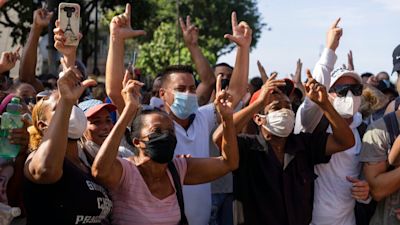One dead during anti-government protests against food shortages in Cuba

Cuban residents in Miami are piling pressure on the US government to do something about the problems in Cuba, ITV News Correspondent Emma Murphy reports
One person has died during protests against the Cuban government over food shortages and high prices.
Diubis Laurencio Tejeda, 36, died on Monday during a clash between protesters and police in the Arroyo Naranjo municipality on the outskirts of Havana, the Interior Ministry of Cuba confirmed on Tuesday.
It added some people were arrested, although it did not specify how many, and some were injured, including police officers.
More than 100 others are said to have been detained or have disappeared since the protests began on Sunday.
Authorities accused protesters of vandalising houses, setting fires and damaging power lines. It also alleged they attacked police and civilians with knives, stones and other objects.
The demonstrations began on Sunday, when thousands of Cubans took to the streets to voice their grievances against food shortages, rising prices and power cuts. Some protesters called for a change of government.
There were no reports of new protests, although Havana still had a heavy police presence on Tuesday.
The Cuban government has accused Cuban Americans of using social media to encourage protests.
The demonstrations are some of the biggest Cuba has seen in years.
The country, which is tightly controlled, is struggling with its worst economic crisis in decades due to US sanctions imposed by President Donald Trump’s administration. It is also facing a surge of Covid-19 cases.
The last major protests over economic hardship took place in 1994.
Foreign Minister Bruno Rodriguez said on Tuesday: “On July 11, there were riots, there were disorders on a very limited scale, opportunistically taking advantage of the difficult conditions in which we Cubans are living today."
He added government experts had found evidence of outsiders using equipment to widely broadcast alarmist and inciting messages over social media.
But Rodriguez said: “On July 11, there was no social explosion in Cuba. There was not because of the will of our people and because of the support of our people for the revolution and its government.”
Cuba’s Roman Catholic bishops issued a call to avoid violence.
They said in a statement: “We understand that the government has responsibilities and has tried to take measures to alleviate the aforementioned difficulties, but we also understand that the people have the right to express their needs, desires and hopes."